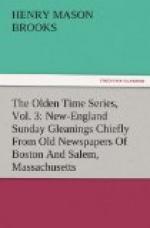of cant. Besides, one of the surest notes of the
worshipping spirit is an increase of sympathy
and love,—sympathy that suggests fellowship,
and love that suggests anything but selfish isolation.
“The irregularity also of attendance upon public worship might be cited as an instance of neglect or levity which ’personal consecration’ alone can cure. In days gone by, attendance upon public worship was a habit, and nothing that could be avoided was allowed to interfere with it. Twice on the Sunday, too, was the rule, and not, as now, the decided exception. But with many it is now becoming once every other Sunday, or scarcely that; with so little of ‘personal consecration’ in the matter that the need for an umbrella may decide the doubter not to go.
“Do we not, again, listen too much merely for delight? and does not the question, ‘How did you like the sermon,’ or ’How did you like the service,’ indicate that we join in the service and listen to a sermon in an entirely wrong spirit? The critical or self-regarding spirit has its uses, but it may be fatal to ‘personal consecration’ in public worship. How often does an entire service depend upon our own temper, our own mood, our own spirit? And how often is it true that a congregation has as much to do with the making of a minister as the minister has to do with the making of a congregation?
“‘If I neglect
public worship, then,’ a man should say to
himself, ’the
community is injured, the brotherhood is weakened,
the young are confused.
It is a grave responsibility.’
“But now we must not shrink from the question: How far or how long ought these considerations to hold the man who has lost delight in public worship or faith in that to which it bears witness? When should doubt make worship impossible, or unbelief make worship wrong for the honest soul? When should ’personal consecration’ say to a man, not stay, but depart? It is a grave question, and every one must shape his answer for himself. All I would say is: Give worship the benefit of the doubt: ay! give fellow-worshippers the benefit of the doubt. Continue with them as long as you can; if not as a full believer, then as a devout inquirer, a gentle seeker, a sympathetic friend. Why not? That is possible with us; for the very bond of our union is sympathetic regard for one another’s freedom. It is also specially possible with us because our teachings do not, at all events, outrage the reason and shock the moral sense. Even an agnostic might listen to us and hope that our Gospel is true.
“Special dangers call for special safeguards, special consideration, special wariness. It is an age of splendid advance in science, of restless energy in business, of stupendous activity in politics, of daring questioning everywhere. All that makes against public worship; and yet all that makes public worship a greater necessity




